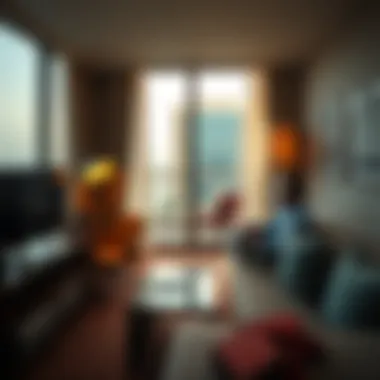Exploring Hotel Apartments: Dubai's Real Estate Gem


Intro
Dubai stands as a vibrant nexus for both tourists and investors alike, and hotel apartments play a pivotal role in its real estate tapestry. They offer a unique blend between the hospitality experience and the comforts of home, catering especially to those who seek extended stays or a taste of luxurious living without the long-term commitment of a typical rental. There is a certain magic to these properties; they provide flexibility, convenience, and a taste of the cosmopolitan lifestyle Dubai is famous for.
The landscape of hotel apartments in Dubai is as diverse as its population. From the bustling heart of Downtown Dubai, where the Burj Khalifa pierces the skyline, to the serene surroundings of Palm Jumeirah, these properties cater to a range of tastes and requirements. With such a variety, the appeal for investors seeking lucrative opportunities is undeniable.
In this guide, we will embark on a comprehensive exploration of the hotel apartment market in Dubai. We will dissect various factors such as current market trends, investment opportunities, the advantages these properties present to different types of travelers, and their intricate place within the broader real estate spectrum. Whether you're a seasoned investor or a first-time buyer, understanding the dynamics of hotel apartments is essential for making savvy property decisions in this dynamic city.
Let's start with an overview of the Market Trends that define the current state and future potential of hotel apartments in Dubai.
Understanding Hotel Apartments
Hotel apartments have emerged as a unique intersection of hospitality and residential living in cities like Dubai. With the city’s booming tourism and real estate sectors, understanding hotel apartments is key for anyone looking to navigate this evolving market. They serve a dual purpose: offering temporary accommodation for travelers while presenting long-term investment opportunities for property buyers. This duality is what makes hotel apartments worth diving into, especially in a city like Dubai that attracts millions for both leisure and business.
Definitions and Features
At their core, hotel apartments blend the comforts of home with the conveniences typically found in hotels. They usually come fully furnished and equipped with kitchen facilities, allowing residents to cook meals rather than depend solely on expensive room service options. You’ll find amenities such as washers, dryers, and often, a cleaning service which certainly lifts a burden off the shoulders of the occupants.
To break it down a bit further:


- Self-contained living: The option to prepare meals and do laundry makes these apartments appealing for families and long-term visitors.
- Flexible lease terms: Unlike traditional rentals, hotel apartments often offer short-term leases which cater to business travelers or expats who might not want to stay for lengthy periods.
- Essential amenities: Most hotel apartments also provide communal facilities like swimming pools, gyms, and sometimes even restaurants, blending luxury with practical living.
For many, these features resonate strongly. They are perfect for those who seek the comfort of home while still enjoying hotel-like perks; ideal for families on vacation or business folks needing a temporary place to stay.
Comparison with Traditional Hotels
When comparing hotel apartments to traditional hotels, the differences stand out like a sore thumb. Traditional hotels focus primarily on transient guests, aiming for the quick turnover of rooms. The services are often dimensioned accordingly, with room rates that scale based on demand, seasons, and other external factors.
In contrast, hotel apartments foster a more sustained living environment. Here are some distinctions that help illuminate this:
- Pricing Structure: While both can be pricey, hotel apartments often provide better value for longer stays. Discounts usually apply for extended stays, which isn’t always the case with traditional hotels.
- Space and Comfort: Hotel apartments generally offer a more spacious living area, which includes separate bedrooms, kitchens, and sometimes, dining areas. This is a luxury travelers can often miss in a cramped hotel room.
- Personalization of Stay: When you stay in a hotel apartment, you have more control over your living environment. Guests can choose how much or little they wish to interact with hotel services – a welcome change for those who like their privacy.
"The balance between autonomy and service makes hotel apartments a favored option for a diverse array of residents."
The distinctions between these two forms of accommodation can greatly influence decisions for travelers and investors alike. By weighing the pros and cons of each, stakeholders can better position themselves within the competitive landscape of hotel apartments in Dubai.
Dubai's Hospitality Market Overview
In the realm of real estate, understanding the dynamics of the hospitality market in Dubai is essential for stakeholders. This segment not only highlights the trends of hotel apartments but also provides insight into the broader context of the city's hospitality sector. Dubai's strategic positioning as a global gateway has spurred numerous developments in its accommodation offerings, especially hotel apartments. This is crucial for potential investors and buyers who aim to capitalize on the evolving tourist landscape.
Current Trends


Today, various trends characterize Dubai's hotel apartment market. One significant trend is the growing preference for extended stay options. Travelers now often favor hotel apartments that provide residential comforts alongside hotel-like amenities. This shift aligns with the increasing number of leisure and business travelers seeking longer stays that offer more flexibility.
Moreover, many hotel apartments feature integrated services like coworking spaces, making them attractive to digital nomads who require both work and relaxation environments. Such attributes cater to a diverse crowd, from expatriates to corporate travelers.
A few essential aspects of current trends include:
- Emphasis on Value for Money: Travelers are keen on experiences that offer both comfort and affordability.
- Tech-savvy Experiences: Many properties are adopting smart technologies, enhancing guest experiences and operational efficiency. This includes mobile check-ins, digital concierge services, and smart room controls.
- Sustainability Focus: Eco-friendly practices are gaining ground, with many hotel apartments adapting green policies to meet rising consumer expectations for sustainable travel options.
Impact of Tourism
Tourism plays a pivotal role in shaping the hotel apartment market in Dubai. Dubai has positioned itself as a premier tourist destination owing to its iconic attractions and events, like the Expo 2020, which significantly augmented its visibility on a global scale. The influx of tourists translates to a steady demand for accommodation, compelling the hospitality sector to innovate and adapt.
This has led to:
- An increased number of hotel apartments catering specifically to various travel types, whether it’s family vacations, business trips, or solo adventures.
- Greater investment in luxury and mid-range offerings, appealing to a wide audience while ensuring quality and service standards.
- Strategic partnerships between tourism boards and hotel apartment operators to create package deals that enhance visitor experience while boosting occupancy rates.
Thinking about these factors can help those involved in real estate get a better grasp of the market trends, aiding in making informed investment decisions. The implications of tourism extend beyond just immediate profits; they shape the long-term landscape of hotel apartments in Dubai, making it a crucial component of the city's real estate narrative.
Investment Potential of Hotel Apartments


Investing in hotel apartments in Dubai provides a plethora of opportunities and advantages that cannot be overlooked. This section will delve into the complexities of this niche market, highlighting not just potential financial returns but also what makes investing in hotel apartments distinctly appealing. Investors seeking to capitalize on Dubai’s ever-evolving property landscape find hotel apartments to be a strategic choice, thanks to their unique positioning that caters to various demographics.
A major draw for potential investors is the dual revenue stream created from both long-term rentals and short-term stays. Florida’s economy has set a consistent upward trend post-COVID, particularly in the tourism sector. The consistent influx of tourists translates to increased demand for hotel apartments, especially in hotspot areas such as Downtown Dubai and Dubai Marina. This aligns well for investors to consider hotel apartments as a lucrative venture.
Moreover, operational flexibility is another key advantage. Unlike traditional hotels, hotel apartments allow owners to be flexible with management options. Owners can choose to self-manage or entrust their properties to professional management companies. The latter often comes with the added benefit of established marketing strategies that can attract guests efficiently.
When assessments are being made regarding investments, it’s crucial to consider the location factors. Properties located near major attractions, business centers, and public transport hubs tend to fetch higher rental prices, enhancing overall returns. For example, a hotel apartment located in Business Bay offers easy accessibility to the Dubai Mall while attracting business travelers and vacationers alike.
An additional talking point is the lower operational costs in comparison to traditional hotel management. Hotel apartments typically avoid some of the extensive services and staffing requirements found in hotel settings, liberating owners from hefty expenses. Furthermore, the maintenance and upkeep of these apartments can be streamlined with the right management approach.
In essence, the investment potential of hotel apartments in Dubai captures a unique blend of high demand, flexible management, prime locations, and lower operational costs. This juxtaposition of elements creates an inviting landscape for investors hoping to tap into the city’s booming hospitality market.
Rental Yields Explained
Delving deeper into the financial mechanics, let’s take a closer look at rental yields when it comes to hotel apartments. Rental yields are a critical factor for any investor, serving as a measure of return on investment. In general, rental yields for hotel apartments in Dubai hover around an attractive percentage, often exceeding traditional residential rental yields.
Factors contributing to these figures include:
- High Occupancy Rates: The hospitality sector in Dubai enjoys impressive occupancy rates, sustained by tourism and expatriate needs.
- Seasonal Pricing Strategies: Unlike fixed rental agreements, hotel apartments can command varying prices depending on the season, events, or holidays. This ensures that income fluctuates positively during peak times.
- Maintenance and Management Costs: The relatively lower operational costs common with hotel apartments also help increase net yield.
To illustrate, a hotel apartment in the heart of Dubai Marina, fetching a competitive rate of AED 300 a night during peak season, can result in substantial monthly income for the owner. Even during off-peak times, the consistent stream of business travelers allows owners to maintain a steady flow of income, ensuring survival through economic fluctuations.
Knowing how to effectively calculate rental yield and monitor changing conditions can empower investors to make informed decisions about their properties. A general formula to determine rental yield is:
Rental Yield (%) = (Annual Rental Income / Property Purchase Price) x 100











